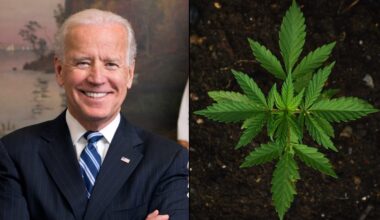The Drug Enforcement Administration (DEA) is suggesting that a doctor seeking psilocybin for terminally ill patients under federal “Right to Try” (RTT) laws has a financial interest that renders him ineligible to get a fee waiver for records requested by his attorney.
Sunil Aggarwal, a Washington State-based palliative care specialist, has been fighting for access to the psychedelic for over a year, taking DEA to court after the agency refused to clear the way for psilocybin to be used as an investigational drug covered under RTT statute.
As part of their efforts to better understand DEA’s administrative process, Aggarwal and his counsel have submitted several Freedom of Information Act (FOIA) requests for relevant documents. They’ve previously accused the agency of using deliberate delay tactics in processing those requests—the subject of a secondary lawsuit—but now they’re calling attention to a specific example that they say shows DEA is trying to “avoid producing records.”
After asking for records related to both the RTT case and a separate rescheduling petition under FOIA law, the agency responded by designating the request as “commercial” and asking for $11,740 up front to cover initial processing. Aggarwal and his attorney Katheryn Tucker of the Emerge Law Group are strongly contesting the idea that there’s a commercial motivation to the case, and they’ve appealed the categorization to no avail.
“This is a matter of public interest, public health, and overall patient benefit, not just for my two patients named in the suit, but for all my patients and all patients of my colleagues in palliative care medicine,” Aggarwal told Marijuana Moment on Wednesday.
“If I was somehow attempting to monopolize this, then I can understand a concern over commercial interest,” he said. “But since the outcome of our rescheduling petition and other matters we have before the DEA would impact wider public policy and federal agency practice, the whole country could stand to benefit from the information requested in the FOIA filings and in the overall outcome of our case.”
“Other private commercial interests are being served with the DEA refusing to share this information and grant our petitions and waivers, since this is continuing to restrict the number of entities that have ability to work with psilocybin legally,” he added.
Aggarwal, who serves as co-director of the Advanced Integrative Medical Science (AIMS), says federal RTT statute makes clear that seriously ill people qualify for investigational drugs, including psychedelics in Schedule I of the Controlled Substances Act (CSA).
After DEA denied the RTT petition last year, the doctor filed a lawsuit in the U.S. Court of Appeals for the Ninth Circuit, but the court rejected the case on procedural grounds in February, with judges saying they could not reach the merits of the challenge because DEA hadn’t made clear that its denial constituted a final rule that could be appealed.
Plaintiffs then made repeated attempts to get DEA on record about whether it had made a final rule. The agency didn’t give a clear answer, prompting another lawsuit filed in the same federal court in July. As the case proceeded, the plaintiffs have tried to leverage FOIA to gain a better insight into DEA’s administrative thinking.
DEA’s FOIA policy states that it will consider waiving or reducing fees if the requester is shows that the information is “in the public interest because it is likely to contribute significantly to public understanding of the operations or activities of the government and is not primarily in the commercial interest of the requester.”
Aggarwal and Tucker say that they’ve run up against DEA delay tactics before. But this is the first time that the agency has classified one of their requests as commercial.
As they pointed out to DEA in a letter appealing the designation, RTT law specifically “prohibits the compensation of a physician providing care to a patient for the purpose of accessing an investigational drug.”
On Tuesday, DEA replied by saying that it would not be revising the commercial designation, a media advisory says. “DEA contends that there would ‘almost certainly’ be ‘commercial benefits to medical providers,’” it said. “There is no evidence whatsoever to support this assertion.”
With respect to the RTT policy that bars compensation for those who obtain investigational drugs, the agency wrote that their argument “does not resolve the more fundamental issue that your clients appear to be requesting these records in order to help gain access to new medical treatments and that offering new medical treatments would almost certainly carry commercial benefits to medical providers beyond certain specific instances of direct compensation from manufacturers.”
It also maintained that the requesters failed to demonstrate that the records “would be of significant public value,” despite the widespread public interest in DEA administration decision-making and psilocybin in particular.
Beyond taking issue with the FOIA response itself, Aggarwal says this issue speaks to a troubling pattern of administrative delays in a case where there’s little time to waste.
Meanwhile, DEA is also facing increased political pressure from bipartisan lawmakers, who recently took an extra step to provide additional congressional clarification, filing companion bills in the House and Senate in July to reaffirm that the scope of Right to Try policy should include psychedelics.
The legislation would make a technical amendment to the text of the existing statute, with the primary purpose of clarifying—in the face of DEA objections—that RTT policy as signed into law by former President Donald Trump already means that patients with terminal health conditions can obtain and use investigational drugs that have undergone clinical trials, even if they’re Schedule I controlled substances.
The bills were filed about six months after bipartisan members of Congress sent a letter, led by Rep. Earl Blumenauer (D-OR), requesting that DEA allow terminally ill patients to use psilocybin as an investigational treatment without the fear of federal prosecution.
In May, Sens. Cory Booker (D-NJ) and Brian Schatz (D-HI) separately pushed top federal officials to provide an update on research into the therapeutic potential of psychedelics, arguing that ongoing federal prohibition has stymied studies.
—
Marijuana Moment is tracking more than 1,500 cannabis, psychedelics and drug policy bills in state legislatures and Congress this year. Patreon supporters pledging at least $25/month get access to our interactive maps, charts and hearing calendar so they don’t miss any developments.![]()
Learn more about our marijuana bill tracker and become a supporter on Patreon to get access.
—
Psilocybin, along with MDMA, has already advanced in clinical trials and been designated by the Food and Drug Administration (FDA) as a “breakthrough therapy.” Cannabis has also undergone requisite clinical trials.
Activists—including one of the plaintiffs in the RTT case, Erinn Baldeschwiler—staged a demonstration outside of DEA headquarters in Virginia in May, demanding that the agency allow terminally ill patients to access psilocybin therapy.
In a procedural win for scientists and advocates, DEA recently retreated on a proposed ban on psychedelic compounds that experts say have research value. The development came just one month after the agency abandoned separate plans to place five tryptamine psychedelics in Schedule I.
DEA faced significant criticism over the latter proposal, receiving nearly 600 messages during a public comment period, with most opposing the rule change and requesting a hearing. The agency’s own administrative court subsequently agreed that there was a need to hold a hearing on the matter before the prohibition could be enacted—but DEA pulled the proposal instead.
The agency has separately increased production quotas for the production of certain psychedelics like psilocybin in an effort to promote research, but its scheduling decisions have continued to represent obstacles for scientists.
Read DEA’s response to the psilocybin FOIA request and related documents below:
New York Gets 900+ Marijuana Dispensary Applications From People Harmed By Drug War
Medical Disclaimer:
The information provided in these blog posts is intended for general informational and educational purposes only. It is not a substitute for professional medical advice, diagnosis, or treatment. Always seek the advice of your physician or other qualified healthcare provider with any questions you may have regarding a medical condition. The use of any information provided in these blog posts is solely at your own risk. The authors and the website do not recommend or endorse any specific products, treatments, or procedures mentioned. Reliance on any information in these blog posts is solely at your own discretion.







